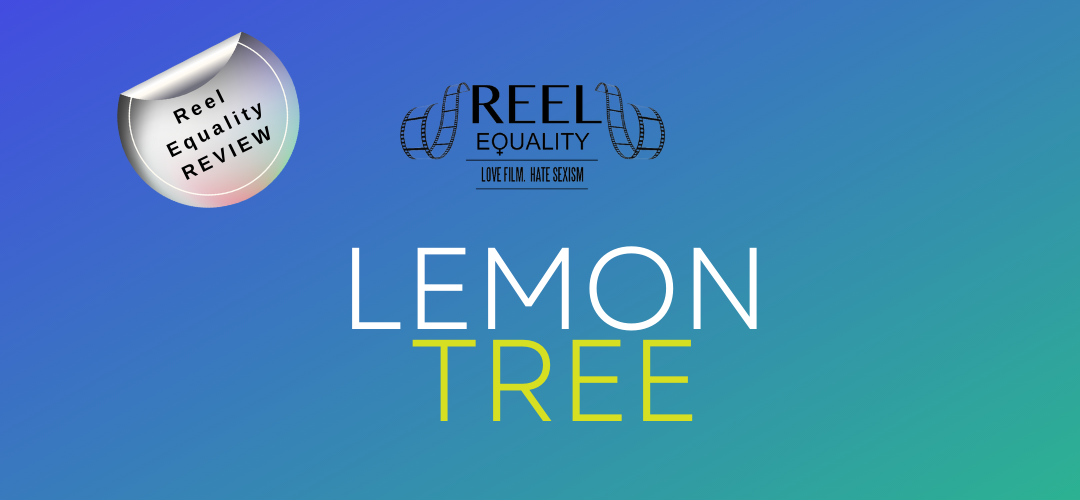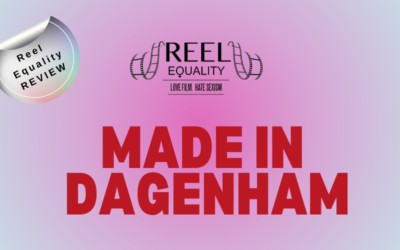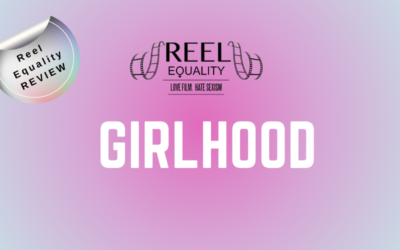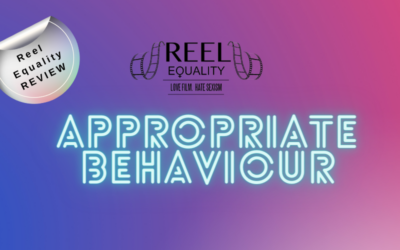Reel Review: Lemon Tree
By Agnes, Reel Equality Film Club Volunteer, 23rd March 2021, 3pm.
Much deliberation went into the way Equation’s Reel Equality Film Club chooses films for screenings. We use the Bechdel Test* to help us decide if the film tells a woman’s story. Other considerations include avoiding films in which women are portrayed only as victims of violence, only in stereotypical female roles (such as carers, or home-makers), or seem there only for their looks or sex appeal. We seek to portray a diversity of women’s stories of different ages, cultures, experiences and backgrounds. We created a detailed checklist of considerations (equation.org.uk/reelequality) but usually, no film ticks all the boxes, and much remains up for debate. Here’s a window onto some of our thoughts… [spoiler alert!]
What is positive about the way Lemon Tree represents women?
Salma is a Palestinian widow living in the West Bank, tending to her lemon orchard. She leads a quiet, humble life. In mainstream storylines, women in Arabic cultures are often portrayed as weak and oppressed, so we could expect that Salma would be shown as someone who meekly accepts everything life throws at her, no matter how unjust. However, Lemon Tree shows the resourcefulness and strong bonds that women form when they pick a battle to protect what’s important to them, regardless of culture or background. In this case, we see a woman take on a minister of the Israeli government with quiet yet fierce determination.
The film also shines a light on the power of female friendships and solidarity between women, which flourishes even across the divide of the Israeli-Palestinian conflict. Salma finds an unexpected ally in the wife of the Israeli Defence Minister, Mira. A complex bond develops between the two women, though mostly at a distance. They meet only briefly and cannot talk to each other because they do not share a language. However, they share the same sense of injustice and loneliness, and Mira defies her husband to speak out in Salma’s support. Both women are intelligent, dignified, and independent-minded.
What is more problematic about the representations of gender in this film?
The life/story of both women is defined by men. Mira’s existence is defined by that of her husband. She exists only as ‘the wife of’ until the very end, when she becomes more independent. Salma is dependent on the help of her lawyer, for whom she develops feelings, which is a rather predictable cliché. The village elders reprimand Salma for her actions and remind her of what is expected from a respectable Muslim widow, i.e. no lawyers and no legal battles. In the end, Salma loses her battle, which is disappointing, but perhaps simply a reminder of the sad truth that in the vast majority of the world, women cannot stand up in a male dominated world and win.
*To pass the Bechdel Test, a film must meet the following 3 criteria: Are there at least 2 women in this film? Do they ever talk to each other? About something other than a man? We are saddened by how few films pass this base-line test…
Other Reviews
Reel Review: Made in Dagenham
Reel Review: Made in Dagenham By Kinga, Reel Equality Film Club Volunteer, 31st March 2021. ABOUT OUR FILMS Much deliberation has gone into how Reel Equality Film Club chooses films for screenings. We've detailed many ways in which a film could represent women in...
Reel Review: Girlhood
Reel Review: Girlhood By Sarah, Reel Equality Film Club Volunteer, 31st March 2021 Much discussion and deliberation has gone into how Reel Equality Film Club chooses films for screenings. We've detailed many ways in which a film could represent women in fair or unfair...
Reel Review: Appropriate Behaviour
Reel Review: Appropriate Behaviour By Sarah, Reel Equality Film Club Volunteer, 31st March 2021. Equation’s Reel Equality Film Club carefully chooses films for our screenings (equation.org.uk/reelequality). The Bechdel Test* helps us decide if the film tells...
LET US KNOW WHAT YOU THINK – SHARE YOUR REVIEW AT FACEBOOK.COM/REELEQUALITYNOTTS
No Results Found
The page you requested could not be found. Try refining your search, or use the navigation above to locate the post.
Other Ways to Get Involved
Reel Equality
Equation’s award-winning Reel Equality Film Club shows great movies that tell women-centred stories and challenge gender stereotypes. Join our campaign for better representation of women on screen.
Campaign With Us
We campaign in Nottingham and Nottinghamshire to raise awareness of domestic abuse, gender inequality and signpost survivors to safety and support.
Social Media Ambassadors
Campaigning online is a great way to take action and can be done from anywhere.
How you can help
No matter how much time, money or resources you can afford to give, your support will make a difference.
£10
Give monthly
Could pay for four children
to take part in our early intervention projects
£30
Give once
Could pay for one primary school child to receive our healthy relationship education program
Support equation
Check out the other ways you can support us




